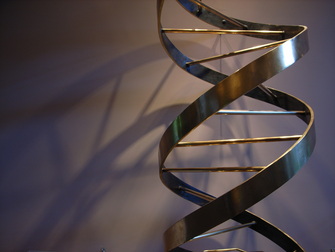
Ancestry is one aspect of the knowledge that can be glimpsed from sequencing the genes of a person. Unlike most molecules in nature, the molecules of DNA contained in our cells are historical documents. They contain information about who our ancestors were, and combined with other information can reveal to us where we came from. Nowadays there are several companies that offer to sequence your genes and provide this kind of information.
But the most important information that the genes can reveal to an individual is about that person’s health. In the years following the completion of the human genome project, scientists have gained a tremendous amount of knowledge about the effects of genes on the risk of acquiring certain diseases. A recent high visibility example of what this knowledge can be used for was when the actress Angelina Jolie decided to undergo a double mastectomy after learning that she has a mutation in a gene called BRCA1 that greatly increases her risk of breast cancer.
As with ancestry, there are several companies that offer their services to sequence genes and provide individuals with information on how their genetic makeup can affect their health. For example, you can learn if you have defective genes that could make treatment with certain drugs fatal or if you have certain genes that can increase your chance of suffering conditions like stroke or diabetes. This genetic information can also be used by doctors to tailor the treatment patients will receive and has the potential to usher in a new era in personalized medicine.

Currently, sequencing part of a person’s genome to derive ancestry or some health information is affordable, but sequencing the full complement of genes costs several thousand dollars and is outside the reach of the average person. However, technological advancements are reducing sequencing times and making the process cheaper. It is conceivable that within a decade not only will full genetic information be accessible to the average person, but it may even be part of the routine tests that are applied when babies are born. What will we do with that information? Where will it be stored? Who will read it?
Perhaps the Egyptian who carved that maxim in the temple of Luxor had a point. Should we first know ourselves before we know our genes?
Photo credits:
Double Helix: Jun Seita / Foter.com / CC BY-NC
Temple of Luxor: dorena-wm / Foter.com / CC BY-ND
***
If you like this blog you can have links to new blog posts delivered to your e-mail address. Please click here.


 RSS Feed
RSS Feed



